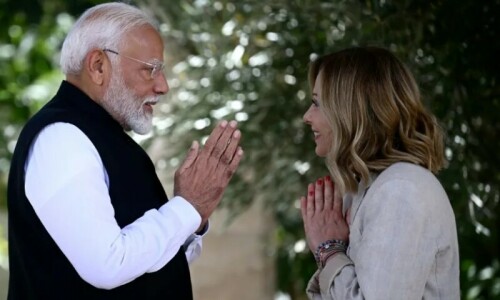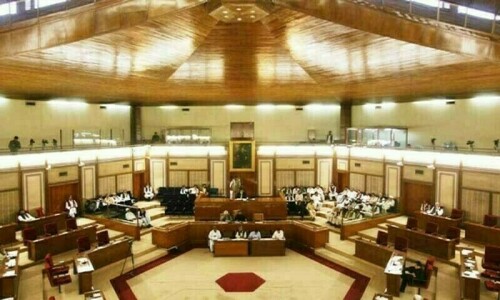A Pakistani and an Indian, best of friends from their student days, now living in Michigan, have decided not to watch together cricketing encounters between their countries of origin live on TV. The memorable last ball six by Javed Miandad in a Pakistan-India match at Sharjah almost drove a wedge between them as the ecstatic reaction by the Pakistani greatly annoyed his friend from the other side of the Great Divide. It could have happened the other way round.
The scenario is 'the best of times and worst of times' when the arch-rivals, to use a convenient cliché, meet on cricket grounds in either of the two countries. History is replete with instances of the crowds becoming hospitable and hostile on different occasions. Shashi Tharoor and Shaharyar Khan's joint effort Shadows across the Playing Field 60 years of India-Pakistan cricket in Roli Books' Cross Border Series presents the two sides of the picture, most often quite honestly.
There is generally an air of friendship outside the cricket grounds. Borders are opened for cricket enthusiasts from the other country when relations between the two neighbours are on the mend. Cabbies don't charge their fares and restaurants refuse to accept payments when the guests come from the other side.
One of the finest moments was the reception that Priyanka and Rahul Gandhi got from the crowd in Karachi in 2004. Young as they both were, they broke the security cordon around them and met the spectators, who shook hands with the two warmly.
I remember distinctly that they were shifted from the Marriot to the State Guest House and treated as state guests.
On the other hand, there was Shiv Sena, the right wing Hindu militant party which dug up the pitch to prevent a Pakistan-India match. Luckily, this was the only incident of the nature. In a later tour, spectators in Chennai gave warm applause to the Pakistan team when it won the Test.
Gavaskar, commentating on the final in the World Cup 1992, could not hide his tilt in favour of Pakistan. 'I will always support Pakistan except when they are playing against India,' he told a journalist from Karachi.
But crowd behaviour has been a problem in both countries, more so when the visiting team is from across the border. On various occasions a section of the spectators have been known to throw oranges and, even worse, small stones, resulting in disruption of matches.
It happened in Karachi in 1989 and two years earlier in Ahmedabad, which strangely Shashi Tharoor doesn't recall. The difference was that while the police in the Indian town were able to control the unruly crowd and the match resumed after the disruption, the Karachi police mishandled the affair, and it turned into a battle between the spoil-sports and the law
enforcers.
But it was certainly not an anti-India affair. Kishore Bhimani, sports editor of Statesman, Calcutta told this reviewer that the spectators in the stand who misbehaved were gentle with the Indian sports writers. “Hamara aap se koi jhagra nahi hai,” (we have no issues with you) they said and escorted them to the car park. A reporter from Indore rode pillion on a motorbike and was dropped at his hotel.
There have also been instances of bigotry. Ziaul Haq declared a public holiday when Pakistan beat India at Lahore in 1978, a decision which was considered farcical by no less a person than Mushtaq Mohammad, the Pakistan captain.
Mixing religion with sports is another unsavoury practice. People like Shoaib Malik, the captain of the runners-up Pakistani team at the first World Twenty20 tournament, thanked Muslims all over the world for supporting his team. He didn't realise that in most Muslim countries cricket is hardly known as a sport.
Of the two writers, Shashi Tharoor, despite his background in international diplomacy, is also a politician, who can't resist dragging politics into the game. What is the relevance of the fact that one country is a democracy and the other has had bouts of dictatorship, one may ask the man who is otherwise generous when praising cricketers' performances, irrespective of their nationality (and religion).
Shaharyar Khan remains the diplomat, which is why he is careful about his statements. At the end of his diplomatic career, he headed the Pakistan Cricket Board, and played a vital role in organising events between the two countries. Details on this count are not generally known, so they make interesting reading, as does his account of the game played in the old princely states, including his grandfather's Bhopal.
Shaharyar also recalls that Imran Khan advocated the commissioning of neutral umpires, a move supported by Nur Khan, the then cricket board chief, and that Pakistan was the first country to have neutral umpires in a Test. The two umpires, who supervised the Test against the West Indies in November 1986, were Indians — Ramaswamy and Reporter
The thumb nail results of the matches between the two countries make the book all the more interesting.
David Page, the series editor, has once again contributed a balanced introduction in what is his fifth venture in the series. The icing on the cake is the imaginatively done jacket of the book.
Shadows across the playing field 60 years of India-Pakistan cricket
By Shashi Tharoor and Shaharyar Khan
Roli Books, India
ISBN 978-81-7436-718-1
190pp. Rs595









































Dear visitor, the comments section is undergoing an overhaul and will return soon.